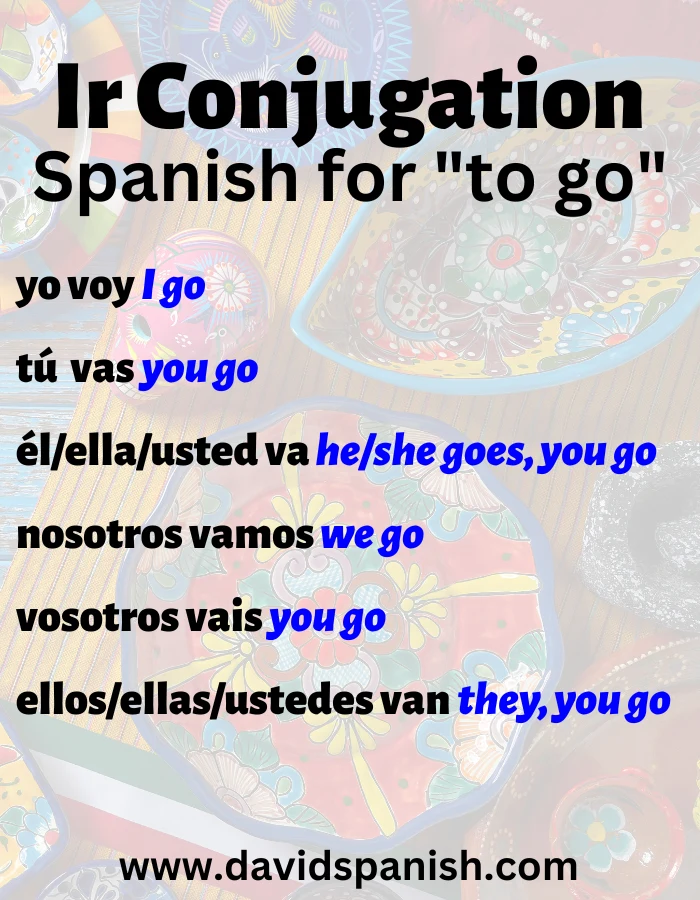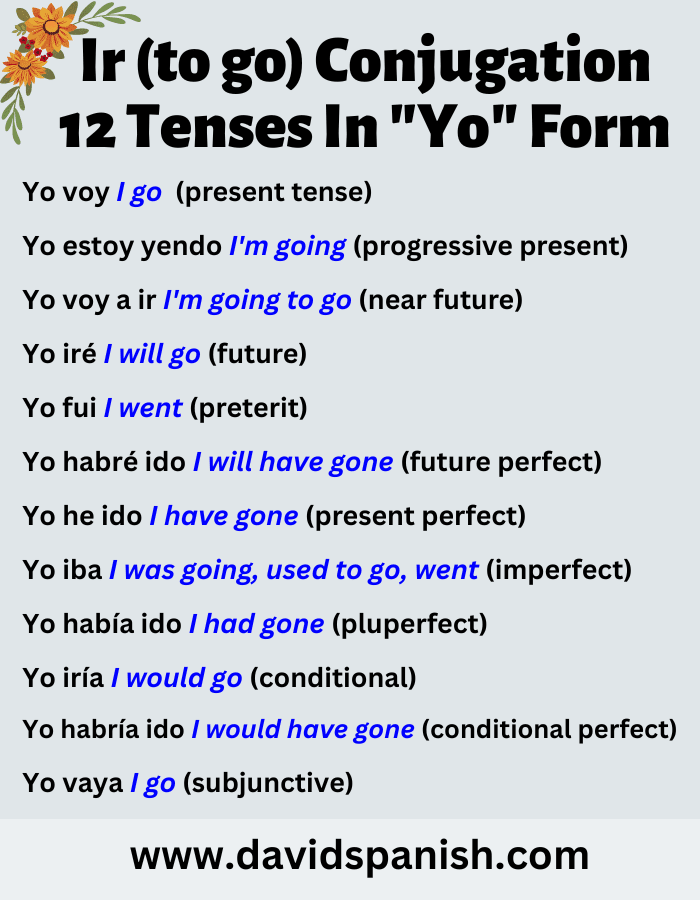In Spanish, the meaning of ir is “to go”. The conjugation of ir in the present is: Yo voy (I go), tú vas (you go), él/ella/usted va (he/she goes, you go), nosotros vamos (we go), vosotros vais (you go), ellos/ellas/ustedes van (they, you go). In this post we’ll provide the complete conjugation tables in nine major tenses with example sentences.

Ir is an irregular IR verb. This means that both its stem and endings are different to other regular IR verbs when conjugated in the present tense. This page on our website covers both regular and irregular Spanish IR verbs in detail.

Further down the page we’ve provided complete conjugation charts for the verb ir (to go in Spanish) with example sentences.
- Present tense (presente de indicativo)
- Progressive present (presente progresivo)
- Near future (futuro inmediato)
- Future tense (futuro)
- Preterite (pretérito)
- Present perfect indicative (perfecto de indicativo)
- Imperfect (imperfecto de indicativo)
- Conditional (potential simple)
- Present subjunctive (presente de subjuntivo)
Ir conjugation table

Ir usage
Ir (to go) is one of the most common verbs in Spanish. Here we’ll learn how to use it.
1. Ir + infinitive
The construction ir conjugated in the present tense followed by an infinitive is used to express actions which will occur in the near future. This is the near future tense. For example:
- Yo voy a comprar un coche nuevo. I’m doing to buy a new car.
- Usted va a vender la casa. You’re doing to sell the house.
- Vamos a viajar en Europa. We’re going to travel in Europe.
- Van a estudiar español. They’re going to learn Spanish.
2. Ir + a
The construction ir + a is used used for expressing going in the direction of or to a place. For example:
- Yo voy a Madrid. I’m going to Madrid.
- Vamos a su casa. We’re doing to his house.
- Usted va a México. You’re doing to Mexico.
- Van a ir a la fiesta esta noche. They’re going to the party tonight.
3. Ir + en
In Spanish, the construction ir + en is used to express to go or travel “by means of”. For example:
- Vamos en coche. We go by car.
- Ellos van en tren. They go by train.
- No van en avión. Van en helicóptero. They’re not going by plane. They’re going by helicopter.
To go by foot, however, is ir a pie.
4. Ir + de
The construction ir de is used to express ideas and plans. Ir de can also be used for “to wear”. For example:
- Voy de vacaciones a Medellín. I’m going on vacation to Medellín.
- Tú vas de compras con tu hermano. You’re going shopping with your brother.
- El va de copas con sus amigos. He goes for drinks with his friends.
- Esta noche voy de traje. I’m wearing a suit tonight.
5. Ir + para
The construction ir + para is used for objectives and destinations. In this context, para can translate to “for” or “in order to”. For example:
- Voy a Cancún para disfrutar de la playa. I’m going to Cancún to enjoy the beach.
- Voy para el centro esta noche. I’m doing downtown tonight.

Ir conjugation charts
Present tense (presente de indicativo)
In the present tense, yo voy translates to “I go” and “I am going”.
| yo voy | I go | Voy a comprar un coche. | I'm going to buy a car. |
| tú vas | you go | Vas a la fiesta | You are going to the party. |
| él/ella, usted va | he/she goes, you go | Él va a Madrid. | He is going to Madrid. |
| nosotros vamos | we go | Nosotros vamos a cantar una canción. | We are going to sing a song. |
| vosotros vais | you go | Vosotros vais a aprender los verbos. | You are going to learn the verbs. |
| ellos/ellas, ustedes van | they go | Ellos van a México. | They are going to Mexico. |
Progressive present (presente progresivo)
The progressive present tense is formed by combining the present tense of estar (to be) with the present participle. Yo estoy yendo translates to “I am going”.
| Yo estoy yendo | I am going | Estoy yendo a la escuela. | I'm going to school. |
| tú estás yendo | you are going | Tú estas yendo al cine. | You're going to the movies. |
| él/ella, usted está yendo | he/she is going, you are going | Ella está yendo a la iglesia. | She's going to church. |
| nosotros estamos yendo | we are going | Nosotros estamos yendo al gimnasio. | We're going to the gym. |
| vosotros estáis yendo | you are going | Vosotros estáis yendo al restaurante. | You're going to the restaurant. |
| ellos/ellas, ustedes están yendo | they are going | Ellos están yendo al baño. | They're going to the bathroom. |
Near future (futuro inmediato)
The near future tense is used express actions which will occur in immediate future. The tense is formed with the following construction: present tense of ir prepositon a + infinitive. For example, yo voy a ir translates to “I’m going to go”.
| yo voy a ir | I'm going to go | Voy a ir a Costa Rica. | I'm going to go to Costa Rica. |
| tú vas a ir | you're going to go | No vas a ir a la escuela hoy. | You're not going to go to school today. |
| él/ella, usted va a ir | he/she's going to go, you're going to go | Él va a ir en el centro con su amigo. | He's going to go downtown with his friend. |
| vamos a ir | we're going to go | Vamos a ir a la oficina. | We're going to go to the office. |
| vosotros vais a ir | you're going to go | Vosotros vais a ir a Portugal. | You're going to go to Portugal. |
| ellos/ellas, ustedes van a ir | they're/you're going to go | Ellos van a ir de vacaciones en mayo. | They're going to go on vacation in May. |
Future tense (futuro)
The Spanish future tense is used to describe future events. Yo iré translates to “I will go”.
| yo iré | I will go | Yo iré a Barcelona con mi familia. | I'll go to Barcelona with my family. |
| tú irás | you will go | ¿Cuándo irás a Cuba? | When will you go to Cuba? |
| él/ella, usted irá | he, she, you will go | Él irá a Londres con su esposa. | He'll go to London with his wife. |
| nosotros iremos | we will go | Nosotros iremos a los Pirineos para esquiar. | We'll go to the Pyrenees to ski. |
| vosotros iréis | you will go | Vosotros iréis a los Estados Unidos para estudiar. | You'll to the United States to study. |
| ellos/ellas, usted irán | they, you will go | Ellos irán a México para aprender Español. | They'll go to Mexico to learn Spanish. |
Preterite (pretérito)
The preterite tense in Spanish is to to describe past actions which occurred a defined moment in time.
| yo fui | I went | Fui a Puerto Rico el año pasado. | I went to Puerto Rico last year. |
| tú fuiste | you went | ¿Fuiste a Bariloche? | Did you go to Bariloche? |
| él/ella, usted fue | he, she, you went | Ella fue a Ushuaia con su amiga. | She went to Ushuaia with her friend. |
| nosotros fuimos | we went | Fuimos a Valle Nevado para esquiar. | We went to Valle Nevado to ski. |
| vosotros fuisteis | you went | Vosotros fuisteis a Bogotá para trabajar. | You went to Bogotá to work. |
| ellos/ellas, ustedes fueron | they went | Ellos fueron a Puerto Vallarta para disfrutar de la playa. | They went to Puerto Vallarta to enjoy the beach. |
Present perfect indicative (perfecto de indicativo)
The present perfect indicative is used to express past actions which may be ongoing and have an impact on the presnt.
| yo he ido | I have gone | Yo he ido a la escuela esta semana. | I have gone to school this week. |
| tú has ido | you have gone | ¿Tú has ido Miami últimamente? | Have you gone to Miami recently? |
| él/ella, usted ha ido | he/she has gone, you have gone | Él ha ido a Paris dos veces este año. | He has gone to Paris two times this year. |
| nosotros hemos ido | we have gone | Nosotros no hemos ido a Cordoba esta semana. | We have not gone to Cordoba this week. |
| vosotros habéis ido | you have gone | Vosotros habéis ido a Mallorca con vuestros amigos. | You have gone to Mallorca with your friends. |
| ellos/ellas, ustedes han ido | they, you have gone | Ellos han ido a La Habana para comprar puros. | They have gone to Havana to buy cigars. |
Imperfect (imperfecto de indicativo)
In Spanish, the imperfect tense is used to describe past action which occurred regularly or at undefined times.
| yo iba | I used to go, was going, went | Yo iba a la piscina cuando ere niño. | I used to go to the swimming pool when I was little. |
| tú ibas | you used to go, were going, went | Tú ibas a la escuela con tu hermanos. | You used to go to school with your brothers. |
| él/ella, usted iba | he/she used to go, was going went / you used to go, were going, went | Él iba a la iglesia con sus padres. | He used to go to church with his parents. |
| nosotros íbamos | we used to go, were going, went | Nosotros íbamos al parque para jugar al fútbol. | We used to go the park to play soccer. |
| vosotros ibais | you used to go, were going, went | Vosotros ibais a los Pirineos para esquiar. | You used to go the the Pyrenees to ski. |
| ellos/ellas, ustedes iban | they/you used to go, were going, went | Ellos iban a Cancún para disfrutar de la playa. | They used to go to Cancun to enjoy the beach. |
Conditional (potential simple)
In Spanish, the conditional tense is used for hypothetical situations and equates to “would” in English.
| yo iría | I would go | Yo iría al cine si tuviera el coche. | I'd go to the movies if I had the car. |
| tú irías | you would go | Tú irías a las montañas hubiera más nieve. | You'd go to the mountains if there were more snow. |
| él/ella, usted iría | he/she/you would go | Ella iría a Espana si tuviera un billete de avión. | She'd go to Spain if she had a plane ticket. |
| nosotros iríamos | we would go | Nosotros iríamos a la fiesta si tuviéramos una invitación. | We'd go to the party if we had an invitation. |
| vosotros iríais | you would go | Vosotros iríais a Suiza si tuvierais más dinero. | You'd go to Switzerland if you had more money. |
| ellos/ellas, ustedes irían | they/you would go | Ellos irían a los a Estados Unidos si más tuvieran más tiempo. | They'd go to the United States if they had more time. |
Present subjunctive (presente de subjuntivo)
The subjunctive mood is used to express feelings of wish, emotion and doubt.
| yo vaya | I go | Es importante que vaya a la escuela. | It's important that I go to school. |
| tú vayas | you go | Es una lastima que no vayas a Montevideo. | It's a pity that you're not going to Montevideo. |
| él/ella, usted vaya | he/she goes, you go | Es necesario que él vaya con su hermana. | It's necessary that he goes with his sister. |
| nosotras vayamos | we go | Quiere que vayamos juntos. | He wants us to go together. |
| vosotras vayáis | you go | Es probable que vayáis a Turquía. | It's probable that you're going to Turkey. |
| ellos/ellas, ustedes vayan | they, you go | Más vale que ellos vayan con nosotros. | It's better that they go with us. |
Discover more:
- Hablar (to have) conjugation
- Guide to ser vs. estar
- Guide to Spanish AR verbs
- Guide to Spanish IR verbs
- Guide to Spanish ER verbs
- La Bamba Meaning, Spanish Lyrics & English Translation - May 4, 2024
- Bésame Mucho Meaning, Spanish Lyrics & English Translation - May 3, 2024
- Querida – Lyrics, Meaning & Translation - May 2, 2024
